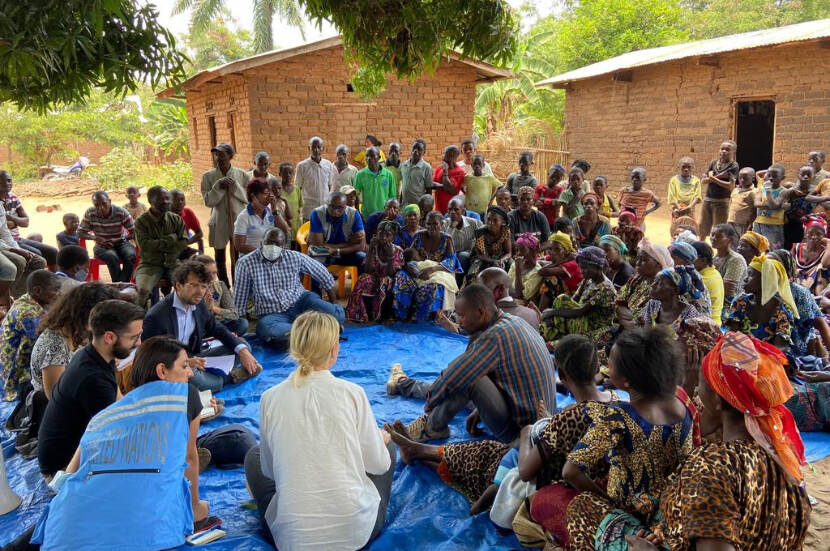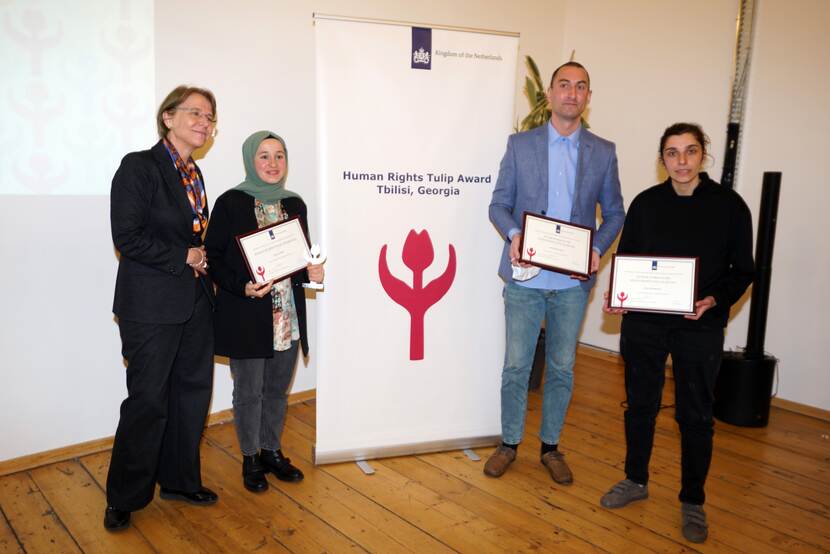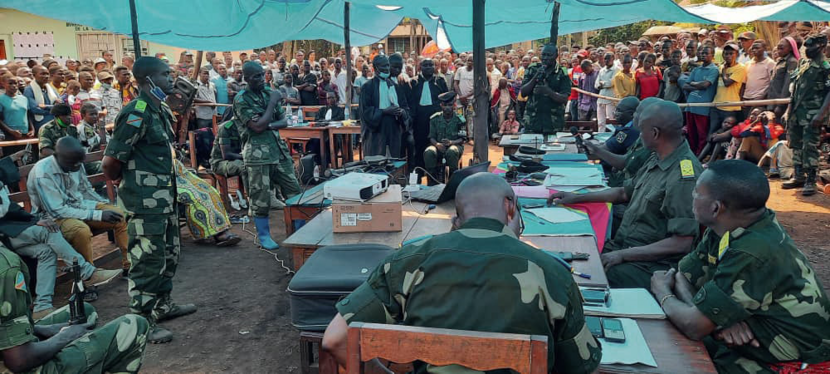Human Rights Day: what can embassies do?
Working through its embassies, the Netherlands promotes human rights and supports human rights activists wherever it can. But what specifically can embassies do for human rights defenders? Staff members at three embassies – in Bogotá (Colombia), Kinshasa (Democratic Republic of the Congo) and Tbilisi (Georgia) – talk about their work. With this mindset, they have accomplished a lot, and protected many people. ‘The Netherlands should give then all the support we can.’

Human rights are a priority of Dutch foreign policy. Activists who stand up for these rights need to be protected. So human rights are a major issue for Dutch embassies. What specifically are the embassies doing for human rights defenders? And how much difference does it make?
Safety
The Netherlands supports human rights defenders in all kinds of ways, by contributing to their safety, for example. Dutch embassies are in regular contact with activists. ‘Sometimes all we can do is listen while they tell us about their situation or their cause,’ says Piter Pals, second secretary at the embassy in Kinshasa in the Democratic Republic of the Congo. ‘But they feel that contact with a foreign embassy gives them a measure of protection, since the embassy maintains contact with the country’s authorities.’
The embassy will subsequently bring an issue or case against a human rights activist to the attention of the government. ‘Here in Kinshasa, government officials are quite receptive to us,’ says Piter Pals. ‘The culture is open. But I sometimes see that nothing much changes. Sometimes it’s because other interests are at stake, but sometimes just because the government has too little capacity to take targeted action against human rights abuses in a huge country like the DRC.’
The embassy in Colombia has deliberately opted for a selective approach to human rights issues. ‘The Dutch embassy and the embassies of several other EU countries decided to take a joint approach to human rights activists,‘ says Thys Hoekman, first secretary for political affairs at the Dutch embassy in Bogotá. ‘We divide activists between us, so that we can protect as large and diverse a group as possible. We give “our” human rights activists extra attention, and demonstrate our involvement in their cause and their personal situation. Sometimes we give them extra exposure, and raise their case with the authorities. This happened in the case of a female journalist who was raped in the presence of police officers, which we highlighted especially at her specific request. But we can’t do everything.’
Activists murdered
In Colombia, hundreds of activists – journalists, land rights defenders, LGBTI activists and peacebuilders – are murdered each year. After years of conflict, the members of the guerrilla group FARC laid down their arms and, in 2016, signed a ceasefire with the government.
Since then, unfortunately, various armed groups have filled the vacuum left by the FARC’s demobilisation, says Hoekman. ‘The government has very little control over large parts of the country. Armed groups grow coca, are involved in illegal logging and are, in fact, in control. Human rights activists who rise up against them receive threats or are murdered.’ So it’s wrong to think that the government itself is responsible for murdering human rights defenders. ‘But they could most certainly do more to prevent it,’ he says. ‘Many cases are not or hardly even investigated by either the police or the criminal justice authorities.’
Rape and lawlessness
The situation in the DRC is comparable. Here, however, in addition to the many armed groups, the government – the army in particular – is also responsible for human rights abuses. In the east of the country – which is rich in minerals – it is difficult for the government to exercise control. Local militias and the army often use force, especially against women, and plunder the mines. ‘Government has too little authority here, and the legal system barely functions, perpetuating this kind of violence and corruption,’ says Piter Pals.
In Georgia, women’s and LGBTI people’s rights in particular need to be better observed. ‘On paper, there are safeguards,’ says Lela Lomia, political affairs officer at the embassy in Tbilisi. ‘But these are rarely applied in practice. Unlike in other countries, Georgia has no laws against LGBTI people. Violence against women is an offence, and Georgia has ratified the Istanbul Convention. But it is a conservative country, heavily under the influence of the Georgian Orthodox Church.’
This became very clear in July this year when a march, organised by LGBTI groups as part of the first Tbilisi Pride, had to be called off due to violent protests by various ultranationalist groups. Attacks on journalists and gay activists are not being properly investigated, and though several culprits have been arrested, no action has yet been taken to prosecute the apparent organisers. ‘We have joined other EU embassies in calling for them to be brought to justice,’ says Lomia ‘But so far our efforts haven’t achieved much.’

Shelter Cities
The Netherlands actively contributes to ensuring local activists’ safety. The three embassies each work with the Shelter City programme. Activists may find temporary shelter and respite in one of the Shelter Cities – in the Netherlands or in a safe house in a neighbouring country. ‘Activists from the region, from former Soviet countries for example, sometimes prefer to take part in a programme in Tbilisi Shelter City. That’s easier for them, in terms of language and culture,’ says Lomia.
Thys Hoekman is proud to say that the Dutch embassy in Bogotá has helped 79 human rights defenders to a safe house this year. ‘These activists stay in a safe place for two months, until the threat against them abates,’ he says. ‘It does them so much good that by the end of their stay they look like different people.’
Visibility
Apart from supporting activists and contributing to their safety, the embassies also promote human rights through various projects. The embassy in Georgia works with local organisations. One of these organisations wants to make gay life more visible in society, another provides psychosocial support to people who have come out. There is also a project to support sportswomen in their fight against sexism, sexual harassment and sexual abuse in sport.
‘School books often contain stereotypes, and are biased against certain groups,’ says Lomia. ‘Working with publishers, we have made these books more neutral and ensured that they do more justice to minorities. We have also supported a series of TV programmes that interview members of the various religious minorities here. More visibility for these groups in society is a first step towards mutual understanding.’
Visibility is a theme in Colombia too. The embassy awards grants to journalists who report on the situation in certain parts of the country. ‘We’re in contact with the next-to-the-largest newspaper here,’ says Thys Hoekman. ‘Thanks to our contribution and contacts, the newspaper publishes an article every other month about human rights activists in isolated parts of the country. People need to understand that human rights defenders are fundamental to securing peace in the country and to a better future.’

Justice
It’s hard to gain access to justice after human rights abuses in the DRC because a reliable legal system is almost impossible to set up there. For this reason, the Netherlands supports a programme in the east of the country, the region where violence is most prevalent, to bring perpetrators to trial locally. With a local partner, the embassy supports lawyers who assist victims. A number of generals in the Congolese army have thus been brought to trial for both corruption and use of violence. Legislation is also under preparation to provide human rights activists with more legal protection.
Piter Pals from the embassy in Kinshasa hopes that initiatives like these will put the country on a more solid footing. ‘The lack of legislation and stable government bodies make human rights work difficult,’ he says. ‘The heart of the problem is that the government has multiple interests, or is often absent. And this has an all-pervasive influence. There are so many human rights abuses and there is so much poverty, and there is no basis for reaching solutions. I am proud of our programmes, which are trying to change this.’
Helpless
For embassy staff, human rights are not the easiest topic to work on. ‘On the one hand, I feel really useful. Human rights defenders appreciate what we do, and that counts,’ says Hoekman. ‘But on the other, I sometimes feel really helpless. Especially when I see how the constant threats and deaths of colleagues affect the mental state of so many activists. That is heartbreaking.’
Pals also finds it difficult to cope sometimes. ‘The reports of sexual violence against women in the eastern DRC are intense and emotionally draining,’ he says. ‘We are talking about brutal, widespread rape, sometimes of very young girls. When I talk to activists who work year in year out to denounce this and try to improve the situation any way they can, I sometimes wonder how on earth they manage to keep going. But their perseverance inspires me. With this mindset, they have accomplished a lot, and protected many people. The Netherlands should give then all the support we can.’